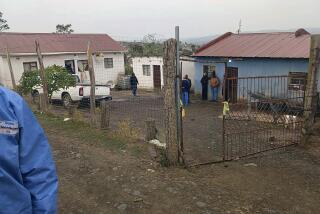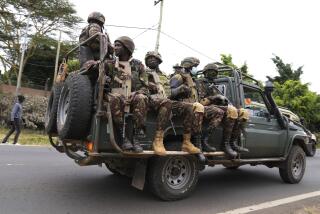Violence erupts in Kenya
- Share via
ELDORET, KENYA — Angry mobs clashed with police Thursday in several Kenyan cities as news spread about the slaying of a second opposition lawmaker in this Rift Valley town.
The newly elected parliament member, David Kimutai Too, and a female companion were shot to death in a car in what police described as a “crime of passion” arising from a “love triangle.”
The suspected killer, a policeman in Eldoret, was said by authorities to be having an affair with the woman, also a police officer in the same police station. The suspect was arrested.
It was the second time in three days that an opposition legislator was slain, heightening fears that this already tense country might erupt into more bloodshed and ethnic clashes. On Tuesday, Melitus Were, also a new parliament member from Kenya’s main opposition party, was shot outside the front gate of his Nairobi home, sparking riots in slums of the capital.
Skeptical leaders with the opposition Orange Democratic Movement immediately condemned the Too death as an assassination by government supporters seeking to erode the party’s advantage as the largest in the new parliament.
Anyang Nyongo, the Orange Democratic Movement’s secretary-general, said the killing was “part of an evil scheme,” noting that Too’s suspected killer was “working in the service of the administration of [Kenyan President Mwai] Kibaki.”
Kenya has been immobilized by insecurity and violence since a disputed Dec. 27 presidential election that both Kibaki and Orange Democratic Movement candidate Raila Odinga claim to have won. An estimated 800 people are believed to have been killed and at least 250,000 displaced. What began as an electoral battle quickly erupted into clashes among rival tribes over land, jobs and, most recently, revenge.
As Kenyans learned Thursday afternoon about the lawmaker’s slaying, residents in many cities hunkered down, bracing for the worst. In what has become an increasingly familiar ritual in this East African country, businesses shuttered windows, bus services halted, government offices closed and schools adjourned.
“The town is deserted,” said Jared Ochanda, chairman of the chamber of commerce in the western city of Kisumu, where rioters and protesters have already burned, looted or damaged more than half of the shops in downtown. “We were just getting back to normal and now it’s continuing again.”
In Nairobi, peace talks that began earlier in the day under the supervision of former United Nations Secretary-General Kofi Annan were temporarily suspended. They were scheduled to resume today with a visit from the current U.N. chief, Ban Ki-moon.
In Eldoret as many as 5,000 frightened people swarmed to police stations, seeking protection from possible revenge attacks, local police said. Angry crowds gathered in front of the hospital where Too’s body was brought. Young men clashed with police and army units in outlying neighborhoods and along major highways, where some attempted to block roads.
One person was killed and 18 others wounded, including 14 who suffered gunshot injuries, in various locations, according to a hospital spokeswoman in Eldoret.
Protesters expressed disbelief that the slain lawmaker, a former high school principal, was involved in an affair.
Lying in a hospital bed in Eldoret as doctors bandaged a bullet wound in his right leg, Aaron Kipkirui, 20, said he suspected government complicity. “This was a premeditated plan,” he said. The police officer “must have been sent there.”
Kipkirui said he was shot by soldiers as he and friends attempted to put up a roadblock nearby to catch members of a rival tribe. He is from the same tribe as the slain lawmaker and he vowed to exact revenge against members of the killer’s tribe.
“We want to burn their houses,” Kipkirui said. “We are not going to relent.”
--
More to Read
Sign up for Essential California
The most important California stories and recommendations in your inbox every morning.
You may occasionally receive promotional content from the Los Angeles Times.













